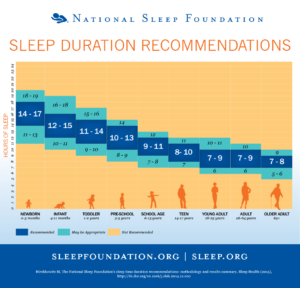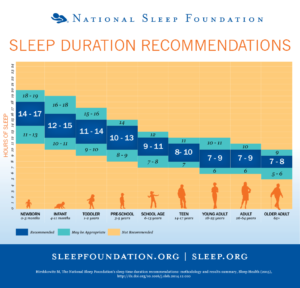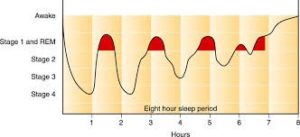
Sleep and the Teenage brain 睡眠和我们的大脑
At the QAIS Community Meeting on January 19th, grades 6 – 12 learned more about something they do every day, and just how very important this “something” relates to their learning, health, and mood. They learned about sleep.

The U.S. National Sleep Foundation recommends that teens get between 8-10 hours of sleep a night. As they sleep, muscles are repaired, skin cells regenerate, immune systems are strengthened, hormones are released, and their bodies grow. Important things are taking place in their brains, too. Cerebral spinal fluid is pumped throughout the brain’s ventricles, working like a vacuum cleaner, clearing away cell garbage and toxic proteins. At the same time, trillions of nerve cells are literally re-wiring themselves, working on the important role of memory storage.
Humans have two different factors which trigger sleepiness: Circadian Rhythm and Sleep-Wake Balance. The circadian rhythm is our internal clock, regulated by the hypothalamus in the brain which sends signals to stay awake. In the evening, as the sun sets and there is less light, the hypothalamus starts to slow down and begins to release melatonin, a hormone that makes us feel sleepy. At the same time, the sleep-wake balance, also regulated by the hypothalamus, reminds the body that it needs to go to sleep after a certain time, and this feeling gets stronger every hour we are awake.
But did you know there is a natural change that affects teens’ sleep cues during adolescence? Teenagers have what is called a “sleep phase delay.” Where they once may have felt sleepy around 8:00 or 9:00 pm before puberty, they may now start to only begin to feel sleepy around 10:00 or 11:00 pm. This can make it difficult for some teens to fall asleep early enough to still get the amount of sleep recommended, since they have to wake up so early for school. But teens can also complicate things by staying up very late doing homework, or sleeping in too long on the weekend, thus disrupting their circadian rhythm.

Sleep is divided into REM (rapid eye movement) also known as active or dreaming sleep, and 4 stages of deep (NonREM) sleep. Different memories are stored during these different stages. During the shorter REM sleep, memories of how to do something (e.g. playing an instrument, how to play a sport, etc.) – things that take a longer time to learn – are stored. During the 4 stages of deep sleep, facts learned during the day (e.g. math equations, capitals of cities, memories of important life events, like the first day of school) are preserved. If children and adolescents do not get adequate sleep, they will not have the opportunity to store and preserve the information they are learning each day.
Many factors can create sleep difficulties for students such as: school work, extra-curricular activities, stress, sleep environment, a wrong view of sleep (thinking they don’t need much),and use of electronic devices. Phones and laptops can disrupt sleep because the screens emit a blue wavelength light which has been shown to disrupt the circadian rhythm and suppress melatonin release. There are risks for not sleeping enough. Obesity, depression, poor academic performance, poor self-control, at risk for accidents, illnesses (disrupts immune system), and as mentioned above – not retaining the information they have learned) are some of examples.
A few ways teens can improve sleep habits are:
- Go to bed the same time each night,
- If you make up sleep for lost on the weekend, only sleep 2 hours more than your normal wake up time
- If you nap, don’t nap for over 60 minutes
- Avoid caffeine
- When using electronics at night, use dimming controls/ “night shift” setting on your phone for a warmer light
- Make sure your room is comfortable – quiet, dark, not too hot, not too cold
- Exercise 20-30 min per day- but not within 2-3 hours of sleep
- If you can’t sleep, get up. Read or listen to music for 30 minutes, and then try again
Parents can help their children by talking to them about the very real benefits of getting adequate sleep, and by guiding them to maintain a healthy school/life balance and schedule. Parents can also serve as reminders for their children. Teen brains are still developing. One area of the brain that develops well into adulthood is the frontal cortex, an area important for decision making and reasoning. Parents sometimes have to “be” their child’s frontal lobe. At times, we may need to make the decision for them and simply tell them it is time to go to bed, as well as help guide them to make their own healthy decisions to get the sleep they need and deserve. Teens at QAIS are learning so much every day. We want our students to get the sleep they need to preserve their learning and memories and to stay healthy and happy.
1月19日,美亚6-12年级学生召开了集体会议,通过这次会议他们对自己每天都做的事情,有了更多的了解。这些看起来平常的事,却蕴含着有关于身心健康的丰富知识。这次,学生们学习了睡眠知识。
美国国家睡眠基金会建议青少年每天的睡眠时间应在8-10小时。睡眠可以放松肌肉,再生皮肤细胞,加强免疫系统,释放激素,从而身体各个机能得到成长。在这个时期,大脑也进行这些重要的变化。脑室汲取大脑的脊髓液,像吸尘器一样,清除细胞的垃圾和有毒的蛋白质。与此同时,数以万亿计的神经细胞正在重新彼此连接,这在记忆存储中发挥着重要作用。
人类有两种不同的因素导致睡意:昼夜节律和睡眠平衡。昼夜节律是我们的生物钟,由大脑中的下丘脑控制,它发出信号,使我们保持清醒。晚上,当太阳落山,光线变弱时,下丘脑开始变慢,开始释放褪黑激素,这是一种让我们感觉困倦的荷尔蒙。与此同时,由下丘脑调节的睡眠平衡提醒身体,它需要在一段时间后入睡,而这种感觉在我们清醒的时候会变得更强。
是你知道吗?在青少年时期,有一种自然的变化会影响青少年的睡眠。
青少年有所谓的“晚睡”。在青春期之前,他们可能会在8点或9点感到困倦,现在他们可能在晚上10点或11点左右才开始感到困。这可能会让一些孩子无法早睡,达到推荐的最佳睡眠量,因为他们还要早起上学。但是青少年也会因为熬夜做功课,或者在周末睡得太多,打乱他们的昼夜节律。
睡眠被分为快速眼动睡眠期,也被称为活跃多梦睡眠期,以及深度睡眠的4个阶段。在不同的睡眠阶段,大脑存储不同记忆。在较短的快速眼动睡眠中,
花费较长时间学习的记忆(例如弹奏乐器,学习体育运动等等)都被存储下来。在深度睡眠的4个阶段中,白天学习的内容(如数学方程式,城市的首都,重要事件的记忆,比如第一天上学)都被保留下来。如果儿童和青少年得不到充足的睡眠,他们将没有机会储存和保存他们每天学习的信息。
许多因素会影响学生睡眠,如:学校功课、课外活动、压力、睡眠环境、错误的睡眠意识 (认为他们不需要太多睡眠),以及电子设备的使用。手机和笔记本电脑会干扰睡眠,是因为屏幕发出蓝色的波长光线会扰乱昼夜节律,抑制褪黑释放。肥胖、抑郁、学业不佳、自控力差、意外事故、疾病(扰乱免疫系统),以及以上所提到的无法很好地记忆所学的知识,就是睡眠不足的一些例子。
青少年改善睡眠习惯的几种方法:
- 每天晚上同一时间上床睡觉
- 如果你想在周末弥补平时的睡眠不足,比正常晚起2个小时就可以。
- 如果小憩休息,不要超过60分钟。
- 拒绝咖啡因
- 在夜间使用电子设备时,使用调光控制/“夜间模式”设置,以获得更温暖的光线。
确保房间的舒适度—安静,光线暗淡,不要太冷或太热。
- 每天运动20-30分钟—不要在睡前2-3小时内进行
- 如果你睡不着,可以起床读书或者听音乐,30分钟后再次尝试入睡。
父母可以和孩子们讨论保持充足睡眠的好处,并指导他们保持健康的学校及日常生活作息规律。父母也要以身作则为孩子做出榜样。青少年时期孩子的大脑还在发育。其中大脑发育良好的一个区域是额叶皮层,这是一个管理决策和推理的重要区域。 父母有时不得不做他们孩子的“额叶”。就像有时,我们可能要替他们做出决定,只是告诉他们,现在该上床睡觉了,并帮助他们做出自己的健康决定,以获得他们需要的基本睡眠。青少年每天的学习任务很重。我们希望我们的学生有充足的睡眠,以维持良好的学习能力和记忆力,并保持健康和快乐。








